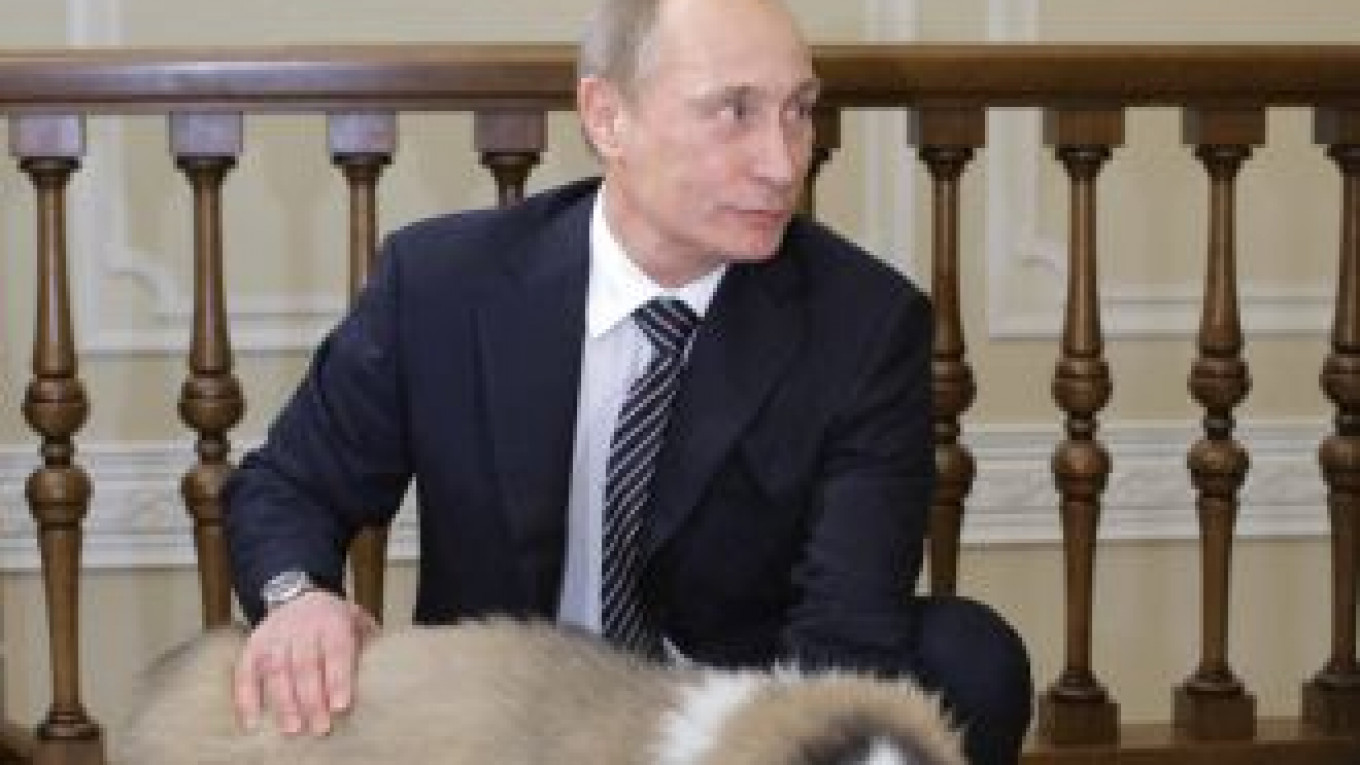Former U.S. Secretary of State James Baker once recalled that Kyrgyz President Askar Akayev gave him a horse when he visited the newly independent nation in Central Asia in the early 1990s.
China has traditionally presented giant pandas to foreign leaders, giving rise to the term “panda diplomacy.”
In what could be dubbed “puppy diplomacy,” President Vladimir Putin received an Akita dog during a visit by Japanese Foreign Minister Koichiro Gemba last weekend.
The 3-month-old puppy, named Yume, flew to Moscow in the business class cabin of the plane after being upgraded by Aeroflot staff, and it received VIP treatment upon arrival, according to Japan’s Kyodo news agency.
Famed for their loyalty, Akita dogs are regarded as a national treasure in Japan. They are named after the country’s northern Akita prefecture, whose governor was the official donor of the puppy. A well-bred Akita dog can cost up to $3,000 in Moscow.
The canine present, first announced by Prime Minister Yoshihiko Noda during talks with Putin at a G20 summit in Mexico in June, comes at a time of rising tensions between Moscow and Tokyo over the disputed Pacific islands known as the Kurils in Russia and the Northern Territories in Japan.
Foreign Minister Sergei Lavrov and Gemba sparred publicly over the islands during last Saturday’s talks in Sochi. But during Gemba’s subsequent with Putin, the issue was officially not raised.
Instead, Putin thanked Gemba for the “sweet present” and announced that he would send a Siberian cat to Japan in return.
Also known as the Siberian forest cat, the breed is believed to be ancestral to long-haired domestic cats around the world.
Putin has in the past carefully cultivated an image of a lover of animals and wildlife, and stories abound about his pet presents — not all of them tame.
His pooch Yume joins Buffy, a Karakachan puppy that was presented to then-Prime Minister Putin in 2010 by his Bulgarian counterpart, Boyko Borisov.
In 2008, Putin caused a small sensation when he revealed that he had accepted a tiger cub as a birthday present. Putin called the cub “the most original present of my life” but refused to say who gave it to him.
In 2005, he was given a pony named Vadik during a horse-racing competition in Tatarstan.
Not much has been seen of these animals in public since. A Kremlin spokeswoman said Thursday that the dogs live in Putin’s residence in Novo-Ogoryovo, outside Moscow.
Observers believe that Putin’s black Labrador, Koni, continues to play the dominant role in his household.
Born in 1999, Koni, whose name is also sometimes spelled Connie, has regularly appeared during Putin’s meetings with world leaders and has Wikipedia entries in eight languages. Said to descend from a dog that belonged to Soviet leader Leonid Brezhnev, she was given to Putin in 2000 by then-Emergency Situations Minister Sergei Shoigu.
Koni made political history herself when she delivered eight puppies on the eve of the 2003 State Duma elections, prompting Putin to make only a hurried appearance at the polling station, because he wanted to rush back to the puppies as fast as he could.
Putin later gave two of the puppies to Austrian President Thomas Klestil. The dogs moved back to Moscow in 2009 when Klestil’s widow, Margot Klestil-Löffler, became Austria’s ambassador to Russia.
The Labrador has even been suggested to play a more direct role in foreign policy. When Putin received Angela Merkel in Sochi in 2007, he reportedly frightened the German chancellor by letting the dog sniff her pants. The incident was later described by German media reports as an attempt to intimidate Merkel, who is said to fear dogs since she was bitten by one as a child.
While live animals have always played a role in international diplomacy, analysts say the tradition of presenting them as gifts is slowly dying out.
“Former Soviet officials now keep presents in their homes that were once unthinkable,” said Olga Kryshtanovskaya, a sociologist who tracks the country’s elite, citing as examples vases and carpets with leaders’ faces on them, a favorite gift in the Stalin era.
Kryshtanovskaya also said she has found that people in the West tend to be less inclined than Russians to give gifts. “I gave up buying large souvenirs after embarrassing my hosts, who had nothing to offer in return,” she said.
A Message from The Moscow Times:
Dear readers,
We are facing unprecedented challenges. Russia's Prosecutor General's Office has designated The Moscow Times as an "undesirable" organization, criminalizing our work and putting our staff at risk of prosecution. This follows our earlier unjust labeling as a "foreign agent."
These actions are direct attempts to silence independent journalism in Russia. The authorities claim our work "discredits the decisions of the Russian leadership." We see things differently: we strive to provide accurate, unbiased reporting on Russia.
We, the journalists of The Moscow Times, refuse to be silenced. But to continue our work, we need your help.
Your support, no matter how small, makes a world of difference. If you can, please support us monthly starting from just $2. It's quick to set up, and every contribution makes a significant impact.
By supporting The Moscow Times, you're defending open, independent journalism in the face of repression. Thank you for standing with us.
Remind me later.







